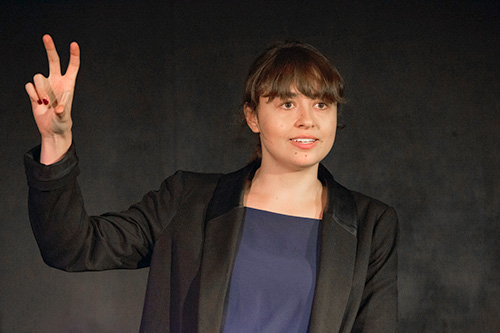Three Plays
Introduction & Table of Contents
 |
| Olivia Nice in the NJ Repertory Company’s October 2017 production of Mountaineer, directed by Suzanne Agins Photo by Andrea Phox. |
| Playwright’s Notes Covenant Mountaineer Nude in Front of the Garden |
|
Blackbird brings together three short plays by Ken Weitzman, each brimming with moments of deep emotion and lighthearted absurdity. Weitzman, who is admittedly intrigued and inspired by extreme acts, explores themes of faith, control, and the strength of human resolve in his three plays: Covenant (or . . . bagels and butchery), Mountaineer, and Nude in Front of the Garden. By examining individual stories and the interiority of his characters, Weitzman transports the reader into the thoughts of three different, yet connected, accounts of will.
For instance, Covenant (or . . . bagels and butchery), which occurs entirely in the small bedroom of a New York apartment, takes the reader into the midst of a fight between a Jewish man, David, and his WASP wife, Liz. An argument breaks out after the mohel who will perform their son’s circumcision is revealed to be cross-eyed. David, struggling with ambivalence toward his Jewish faith and concern for his infant son, contemplates canceling or faking the circumcision, but then notes:
It’s not saying that . . . that I believe that they’ll never come for us again. It’s saying that . . . that we are not afraid if you do. Even us, even those of us who are secular, who are agnostic, who question Israel’s militarism, who are ambivalent to the point of neuroticism. Even we cut the dicks of our newborn sons. And you know what else? We stand around and nosh on bagels and make stupid jokes while we do it.
Taking inspiration from Weitzman’s personal experience, this ironic play creates empathy by discussing the role of ritual and the history of anti-Semitism within the context of traditional Jewish humor.
Similarly, Mountaineer tackles a serious subject—but in a much more somber way. This play takes the form of a monologue by a young woman named Jill, who is tasked with delivering a eulogy for her younger sister Evie. Like many eulogies, it begins with lighthearted memories before pivoting into darkness—Evie, attempting to follow in the footsteps of Saint Patrick, fasted until she died. On its surface, the choice to fast like a saint is absurd (like the existence of a cross-eyed mohel), but here the absurdity is used to indicate a strength of will, an attempt to “inspire mankind to go beyond their own limits . . . to move closer to the divine.”
Nude in Front of the Garden, also inspired by real-life events, takes place at the Stedelijk Museum Amsterdam and tells the story of a mental patient before he assaults a Picasso with a butter knife. The most obviously humorous of the three plays, Nude in Front of the Garden explores the psychology of individuals struggling with mental illness; the narrative considers the themes of security on both a physical and emotional level, as well as the concept of literal versus figurative. The play’s dialogue, at times terse and at times ridiculous, conveys the mental patient’s “disjointed step into [desire]” (according to Weitzman’s “Playwright’s Notes”) as he fights for stability in the metaphorical realm of modern art. ![]()